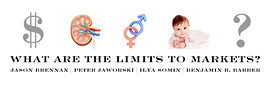Jason Brennan writes,
After reading Benjamin Barber’s careful, fair, charitable, and rigorous essay, I realized Barber is right. Market fundamentalism and libertarianism are cuckoo. We ought to replace our apparent “monolithic monism” with, I suppose, polylithic pluralism. And I’d better start taking seriously the dialectical essence of politics. To that end, I’ve asked Oxford University Press to retract my book Libertarianism, and for Princeton University Press to retractThe Ethics of Voting and the forthcoming Against Politics (a book that Barber would truly hate).
I can find nothing to disagree with in this, the lead paragraph of Brennan’s reply, and - assuming the rest of his response is an elaboration - I have not bothered to read the rest.
****
(Oh, sorry, you mean he is being facetious? How clever is that? I guess I am being facetious too, huh?)
One serious note: Brennan and Jaworski are engaged in word play. I am interested in politics, for which there is no place in this version of the market debate. Although I will admit that there are a number of “candidates” in the Republican field who talk about markets and liberty with an equal obliviousness to the conditions of politics, they too are immune to debate. Like Brennan and Jaworski, they want to tell their interrogators which questions they can be asked, and ignore the rest. So I will rest my “argument” with this: “vote for Hillary.”
See what I mean?

